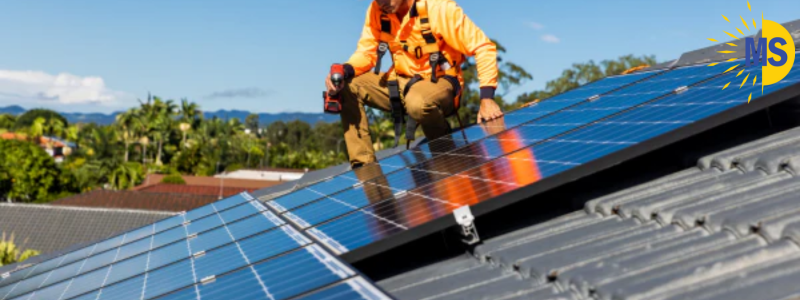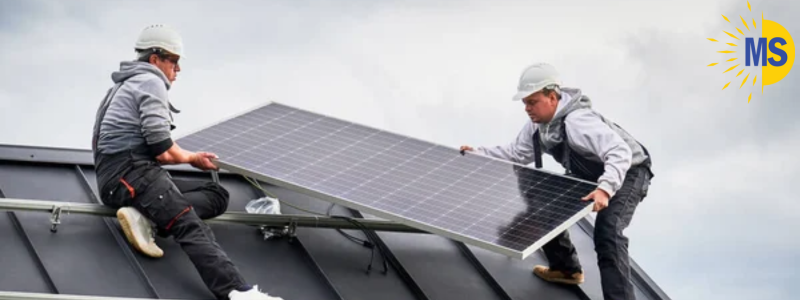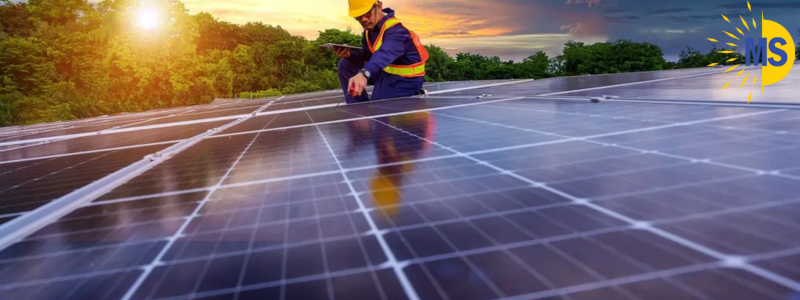Protecting Your Solar Investment from Houston Weather
Your solar panels just survived another brutal Houston summer. The thermometer hit 105°F for weeks, afternoon thunderstorms rolled through like clockwork, and you held your breath during hurricane season. Now you’re wondering – will my $25,000 solar investment actually last 25 years in this unforgiving climate?
It’s a legitimate concern. Houston’s weather doesn’t mess around. From Category 4 hurricanes to golf ball-sized hail, from months of triple-digit heat to surprise ice storms, our climate tests everything it touches. But here’s what might surprise you: properly installed solar panels in Houston are actually designed to handle Houston’s worst weather – often better than your roof itself.
The key lies in understanding the specific threats our climate poses and taking proactive steps to protect your investment. Let’s explore how to ensure your solar system not only survives Houston weather but continues producing clean energy for decades to come.
Houston’s Unique Weather Challenges for Solar

Living in Houston means dealing with weather extremes that would shock homeowners in milder climates. Our subtropical location creates a perfect storm of challenging conditions that solar systems must endure year after year.
The Heat Factor: Summer’s Relentless Test
Houston’s summer heat isn’t just uncomfortable – it’s potentially damaging to solar equipment that isn’t properly selected and installed.
Temperature Extremes:
- Air temperatures regularly exceed 100°F for weeks
- Roof surface temperatures can reach 160-180°F
- Solar panel surface temperatures often hit 150°F+
- Thermal cycling stress from daily temperature swings
Heat-Related Performance Issues:
- Reduced electrical output during peak heat
- Accelerated component aging and degradation
- Thermal expansion stress on mounting systems
- Inverter efficiency losses in extreme temperatures
Protection Strategies: Quality solar installations in Houston use temperature-resistant components and proper ventilation techniques:
- High-temperature rated panels that maintain efficiency in extreme heat
- Elevated mounting systems that allow airflow beneath panels
- Premium inverters with enhanced cooling systems
- Proper spacing between panels for heat dissipation
Hurricane Season: The Ultimate Stress Test
From June through November, Houston lives under the constant threat of tropical storms and hurricanes. Your solar system needs to be hurricane-ready, not hurricane-vulnerable.
Wind Load Requirements:
- Building codes require resistance to 140+ mph winds
- Uplift forces that can exceed 50 pounds per square foot
- Dynamic loading from turbulent wind patterns
- Debris impact resistance during storm events
Hurricane-Hardened Installation Methods:
- Reinforced mounting hardware exceeding code requirements
- Penetration sealing that prevents water infiltration
- Strategic panel placement to minimize wind loading
- Rapid shutdown systems for electrical safety during storms
Recent Hurricane Performance: Solar systems properly installed to Houston standards have shown remarkable resilience:
- Hurricane Harvey (2017): Most professionally installed systems survived intact
- Hurricane Ike (2008): Proper mounting prevented widespread panel loss
- Tropical Storm Allison (2001): Sealed installations avoided water damage
Hail: The Sudden Threat
Houston’s spring and early summer months bring severe thunderstorms capable of producing devastating hail. While hail events are unpredictable, proper preparation can minimize damage.
Hail Impact Standards:
- Solar panels must withstand 1-inch hail at 50 mph
- Premium panels often exceed these minimum requirements
- Tempered glass construction provides impact resistance
- Frame design distributes impact forces effectively
Hail Protection Measures:
- Impact-resistant panel selection with enhanced glass thickness
- Proper installation angles that deflect rather than absorb impacts
- Insurance considerations including comprehensive coverage
- Rapid response protocols for post-storm damage assessment
Flooding and Water Damage Risks
Houston’s flat topography and intense rainfall create flooding risks that can threaten ground-mounted systems and electrical components.
Flood-Prone Installation Considerations:
- Elevated electrical components above flood levels
- Waterproof equipment enclosures and connections
- Proper grounding systems that function when wet
- Emergency shutdown procedures for flood events
Choosing Weather-Resistant Solar Equipment

Not all solar equipment performs equally in Houston’s challenging climate. Selecting components specifically rated for extreme conditions provides the foundation for long-term system reliability.
Premium Panel Selection Criteria
Heat Performance Ratings:
- Temperature coefficient: Look for -0.35%/°C or better
- Operating temperature range: -40°F to +185°F minimum
- Hot spot resistance: Bypass diodes and quality cell manufacturing
- Thermal cycling certification: IEC 61215 testing standards
Structural Durability Features:
- Tempered glass thickness: 3.2mm minimum, 4mm preferred
- Frame construction: Anodized aluminum with reinforced corners
- Junction box sealing: IP67 or IP68 water resistance rating
- Warranty coverage: 25-year comprehensive coverage including weather damage
Inverter Selection for Houston Climate
Inverters are often the most vulnerable component in extreme weather conditions. Choosing Houston-appropriate inverter technology significantly impacts system longevity.
Heat Management Features:
- Passive cooling design without fans that can fail
- Wide operating temperature range (-22°F to +140°F)
- Derating curves that maintain operation in extreme heat
- NEMA ratings for outdoor installation protection
Weather Protection Standards:
- Enclosure ratings: NEMA 4X minimum for outdoor installations
- Corrosion resistance: Marine-grade coatings for humidity protection
- Surge protection: Built-in protection against lightning and grid disturbances
- Rapid shutdown compliance: Latest NEC safety requirements
Mounting System Engineering
The mounting system literally holds your investment together during Houston’s worst weather. Over-engineering the mounting system is smart insurance against extreme conditions.
Wind Load Engineering:
- Structural calculations specific to your roof and wind zone
- Uplift resistance exceeding 50 psf design loads
- Connection redundancy with multiple attachment points per panel
- Professional installation by certified structural technicians
Water Infiltration Prevention:
- Flashing systems that integrate with existing roofing
- Sealant selection rated for extreme temperature cycling
- Penetration minimization through optimized layout design
- Drainage considerations that prevent standing water
Installation Best Practices for Weather Protection

Even the best equipment fails without proper installation techniques designed for Houston’s climate challenges. Professional installation makes the difference between a system that survives and one that thrives.
Structural Assessment and Preparation
Pre-Installation Roof Evaluation: Before installing solar panels, professional assessment ensures your roof can handle both the equipment weight and extreme weather stresses:
- Structural engineering analysis for older homes or complex roof designs
- Roof condition assessment identifying repairs needed before installation
- Load-bearing calculations accounting for equipment, wind, and snow loads
- Material compatibility ensuring mounting hardware works with your roofing
Foundation Reinforcement: Some Houston homes benefit from structural reinforcement before solar installation:
- Rafter reinforcement for older construction or large systems
- Decking upgrades to current building code standards
- Truss modifications when required by engineering analysis
- Professional engineering stamps for permit approval
Hurricane-Grade Installation Techniques
Advanced Mounting Methods:
- Through-bolt mounting where structurally appropriate
- Engineered lag bolt systems with specific torque requirements
- Redundant attachment points exceeding minimum code requirements
- Wind deflector placement to minimize uplift forces
Electrical System Protection:
- Weatherproof connections using marine-grade components
- Surge protection devices at multiple system points
- Grounding electrode systems designed for wet conditions
- Emergency disconnect accessibility for first responders
Quality Control and Testing
Installation Verification:
- Torque specifications verified on all connections
- Electrical testing confirming proper system operation
- Weather seal inspection ensuring water-tight installation
- Structural load testing where engineering requires
Ongoing Maintenance for Weather Resilience
Houston’s climate demands proactive maintenance to ensure long-term system performance and weather resistance.
Seasonal Maintenance Protocols
Pre-Hurricane Season (May-June):
- System inspection for loose connections or damaged components
- Tree trimming to prevent branch damage during storms
- Drainage clearing around roof-mounted systems
- Insurance documentation with updated system photos
Post-Storm Assessment:
- Visual inspection for obvious damage or displacement
- Performance monitoring to identify hidden issues
- Professional evaluation after significant weather events
- Immediate repairs to prevent secondary damage
Summer Heat Preparation:
- Cleaning schedules to maintain peak efficiency during high-demand months
- Ventilation inspection ensuring proper airflow around equipment
- Inverter location assessment for adequate cooling
- Performance monitoring to identify heat-related issues
Professional Maintenance Services
Annual System Check-ups: Regular professional maintenance identifies potential issues before they become weather-related failures:
- Electrical connection tightening preventing arc faults
- Mounting hardware inspection ensuring structural integrity
- Performance analysis comparing actual vs. expected output
- Component lifecycle assessment planning for future replacements
Storm Damage Response: Mianro Solar provides rapid response services after severe weather events:
- Emergency system shutdown if safety concerns exist
- Damage assessment with detailed documentation for insurance
- Temporary repairs to prevent further damage
- Permanent restoration using original or upgraded components
Insurance and Warranty Considerations
Protecting your solar investment involves more than just weather-resistant installation – proper insurance coverage and warranty understanding provide financial protection when weather strikes.
Homeowners Insurance Integration
Coverage Evaluation:
- System value documentation for adequate coverage limits
- Weather damage inclusions specifically covering solar equipment
- Business interruption coverage for lost energy production
- Installation quality requirements some insurers mandate
Claims Process Preparation:
- Pre-loss documentation with detailed system photos and specifications
- Installer relationships for rapid damage assessment
- Performance monitoring data demonstrating system condition
- Professional evaluation services for accurate claim documentation
Manufacturer Warranty Protection
Weather-Related Coverage:
- Manufacturing defects revealed by extreme weather stress
- Performance guarantees accounting for weather-related degradation
- Replacement policies for weather-damaged components
- Installation workmanship coverage for weather infiltration
Warranty Maintenance Requirements:
- Professional installation required for full warranty coverage
- Regular maintenance documentation for warranty claims
- Prompt repair requirements preventing warranty voidance
- Authorized service providers for warranty-covered repairs
Financial Protection Strategies
Weather-related damage can impact both system performance and financial returns. Smart financial planning protects your investment beyond just the equipment itself.
Performance Guarantees and Monitoring
Production Insurance:
- Performance monitoring systems that detect weather-related issues
- Production guarantees that account for weather variability
- Rapid response protocols for performance degradation
- Financial compensation when systems underperform guarantees
Extended Warranty Options:
- Comprehensive coverage beyond standard manufacturer warranties
- Labor and replacement costs for weather-damaged components
- Performance guarantees including weather-related degradation
- Professional maintenance services preventing weather damage
Your Weather-Protected Solar Future
Houston’s weather will always be challenging, but it doesn’t have to threaten your solar investment. With proper equipment selection, professional installation, and proactive maintenance, your solar system can weather Houston’s storms while delivering decades of reliable energy production.
At Mianro Solar, we’ve installed thousands of solar systems throughout the Houston area, and we’ve learned what it takes to build weather-resilient installations. Our systems have survived Harvey, countless hailstorms, and years of brutal summer heat because we engineer every installation for Houston’s specific climate challenges.
We use only hurricane-rated mounting systems, select equipment specifically tested for extreme heat performance, and employ installation techniques that exceed local building codes. Our maintenance programs help ensure long-term weather resilience, and our rapid response team is ready when severe weather strikes.
Ready to protect your solar investment from Houston weather?
Contact Mianro Solar today for a consultation focused on weather-resistant solar solutions. We’ll assess your property’s specific weather risks and design a system built to handle whatever Houston’s climate throws at it.
Don’t let weather concerns prevent you from enjoying solar energy’s benefits. With proper planning and professional installation, your solar system will be producing clean energy long after Houston’s next big storm passes. Call us now at 8444640003 or visit our Houston showroom to learn how we protect every solar investment from our challenging weather. Your weather-resistant solar future starts with the right local expertise.

